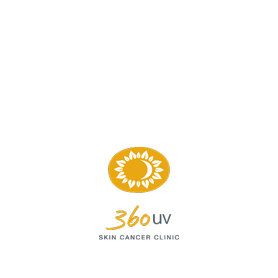
Skin cancer is the most common form of cancer in Australia. Skin cancer is a disease of the body’s skin cells caused mainly by cumulative exposure to ultraviolet radiation (UVR) from the sun. Cancer is a group of diseases in which cells are aggressive (grow and divide without respect to normal limits), invasive (invade and destroy adjacent tissues), and sometimes metastatic (spread to other locations in the body).
Preventing skin cancer from occurring is obviously the best way forward. 360UV utilises cutting edge technology to help you prevent skin cancer from occurring to you.
Find out more about our treatments by selecting an option from the drop down menu.
Skin cancer is mainly caused by exposure to ultraviolet radiation (UVR) from the sun and other sources such as solaria and sunlamps.
Anyone in Australia can develop skin cancer but risk is increased for people who:
Children and adolescents. The more children are exposed to UVR the greater their risk of developing skin cancer later in life. Sun exposure, particularly during the first 15 years of life, has a significant contribution towards lifetime risk of developing skin cancer.
Outdoor workers. It is estimated that 34,000 non-melanoma skin cancers and 200 melanomas are caused by sun exposure in the workplace each year. 3 Spending large amounts of time outside during peak ultraviolet radiation periods, over a long length of time, increases the risk of developing skin cancer.
To reduce your risk of skin cancer, protect yourself in 5 ways:
1. Seek shade
2. Put on a broad-brimmed hat that shades your face, neck and ears
3. Wear sun protective clothing that covers as much of your body as possible. Long sleeved shirts with a collar, and longer style pants or skirts are good for sun protection. Fabric of clothing needs to have a tight weave and be darker in colour to increase your protection from ultraviolet radiation
4. Wear wrap-around sunglasses
5. Apply SPF30+ broad spectrum water resistant sunscreen liberally to clean dry skin, at least twenty minutes before being exposed to the sun, and reapply at least every two hours when outdoors
Also, avoid going outdoors unprotected between 10am-2pm (11am – 3pm during daylight saving), as this is when ultraviolet radiation is the strongest.
Information courtesy www.skincancer.gov.au
A tan does not protect you from skin cancer. In fact, it increases your risk. Any form of a tan which has been obtained from exposure to UVR (from natural or artificial sources) increases your chances of premature ageing and developing skin cancer. People with naturally tanned or darker skin have very limited protection to UVR (roughly equivalent to SPF2 sunscreen) and will still need to protect their skin when going outdoors. Fake tanning products do not offer protection against the risk of developing skin cancer. Some fake tanning products do contain sunscreen, but this will at most only offer protection for a few hours after application of the product.
The technology behind solariums and sunbeds also increases your risk as they emit UVR and increase your risk of developing skin cancer.
Information courtesy www.skincancer.gov.au
In Australia we have the highest incidence of skin cancer in the world.
Dr Alastair Taylor